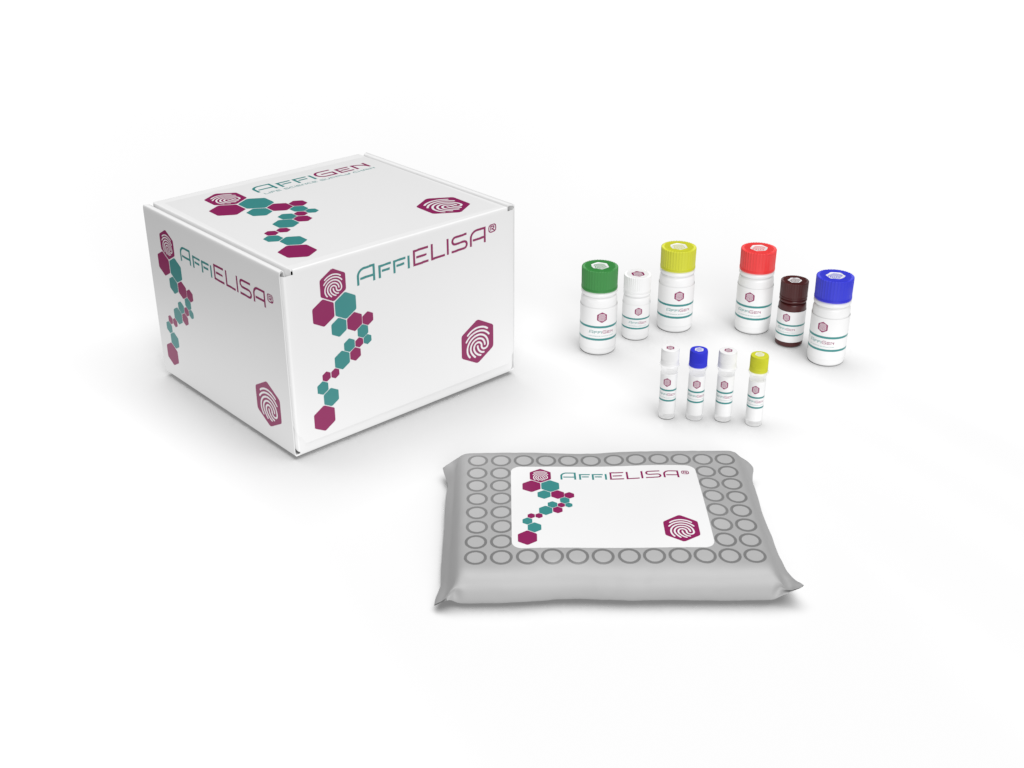AffiELISA® Human Fibrinogen, FG ELISA Kit
The AffiELISA® Human Fibrinogen (FG) ELISA Kit is a laboratory tool specifically designed for the quantitative measurement of fibrinogen levels in human samples.
Fibrinogen is a glycoprotein synthesized in the liver and plays a crucial role in the blood coagulation process. When there is tissue injury or blood vessel damage, fibrinogen is converted into fibrin by the action of thrombin, a key enzyme in the coagulation cascade. This conversion of fibrinogen to fibrin forms a mesh-like structure that helps in clot formation, stopping bleeding and aiding in wound healing.
ELISA (Enzyme-Linked Immunosorbent Assay) is a common laboratory technique used to detect and quantify specific proteins in biological samples. This kit employs antibodies that specifically recognize human fibrinogen, enabling the precise measurement and quantification of its concentration in human samples.
Monitoring fibrinogen levels using ELISA kits like the AffiELISA® Human FG Kit is essential in clinical settings for several reasons:
- Coagulation Disorders: Abnormal levels of fibrinogen can indicate coagulation disorders, such as low levels associated with bleeding disorders or high levels linked to thrombotic events.
- Cardiovascular Risk: Elevated fibrinogen levels are associated with an increased risk of cardiovascular diseases, including heart attacks and strokes.
- Monitoring Treatment: Fibrinogen levels can be monitored in patients undergoing certain treatments, such as anticoagulant therapy or in cases of liver disease where fibrinogen production might be affected.
Accurate measurement of fibrinogen using ELISA kits assists clinicians in diagnosing coagulation disorders, assessing cardiovascular risk, and monitoring patients undergoing treatments impacting fibrinogen levels, contributing to better patient care and management.
Product Specifications
Species
Human
Gene / Target
N/A
Uniprot ID
N/A
Type
N/A
Sample Volume
10 µL
Wavelength
450nm
Human Fibrinogen Background
Human fibrinogen is a vital glycoprotein involved in the blood coagulation process. It's synthesized in the liver and circulates in the blood as an inactive precursor to fibrin, playing a crucial role in clot formation.
Here are its primary functions:
- Clot Formation: Fibrinogen is essential for the clotting mechanism. When blood vessels are injured, fibrinogen is converted to fibrin by the enzyme thrombin. Fibrin strands form a meshwork that traps blood cells, forming a clot to stop bleeding.
- Wound Healing: The formation of fibrin clots at the site of injury is crucial for wound healing. It acts as a temporary matrix that helps cells adhere and facilitates tissue repair.
- Inflammatory Response: Fibrinogen is involved in the inflammatory process by interacting with immune cells and modulating their activity.
- Cardiovascular Health: Elevated levels of fibrinogen in the blood are associated with an increased risk of cardiovascular diseases, including heart attacks and strokes.
Measuring fibrinogen levels is important in clinical settings. Low fibrinogen levels may indicate bleeding disorders, while high levels could signify clotting disorders or increased cardiovascular risk. Tests like ELISA (Enzyme-Linked Immunosorbent Assay) enable the quantification of fibrinogen levels in human samples, aiding in diagnosing and monitoring various health conditions related to coagulation and cardiovascular health.
